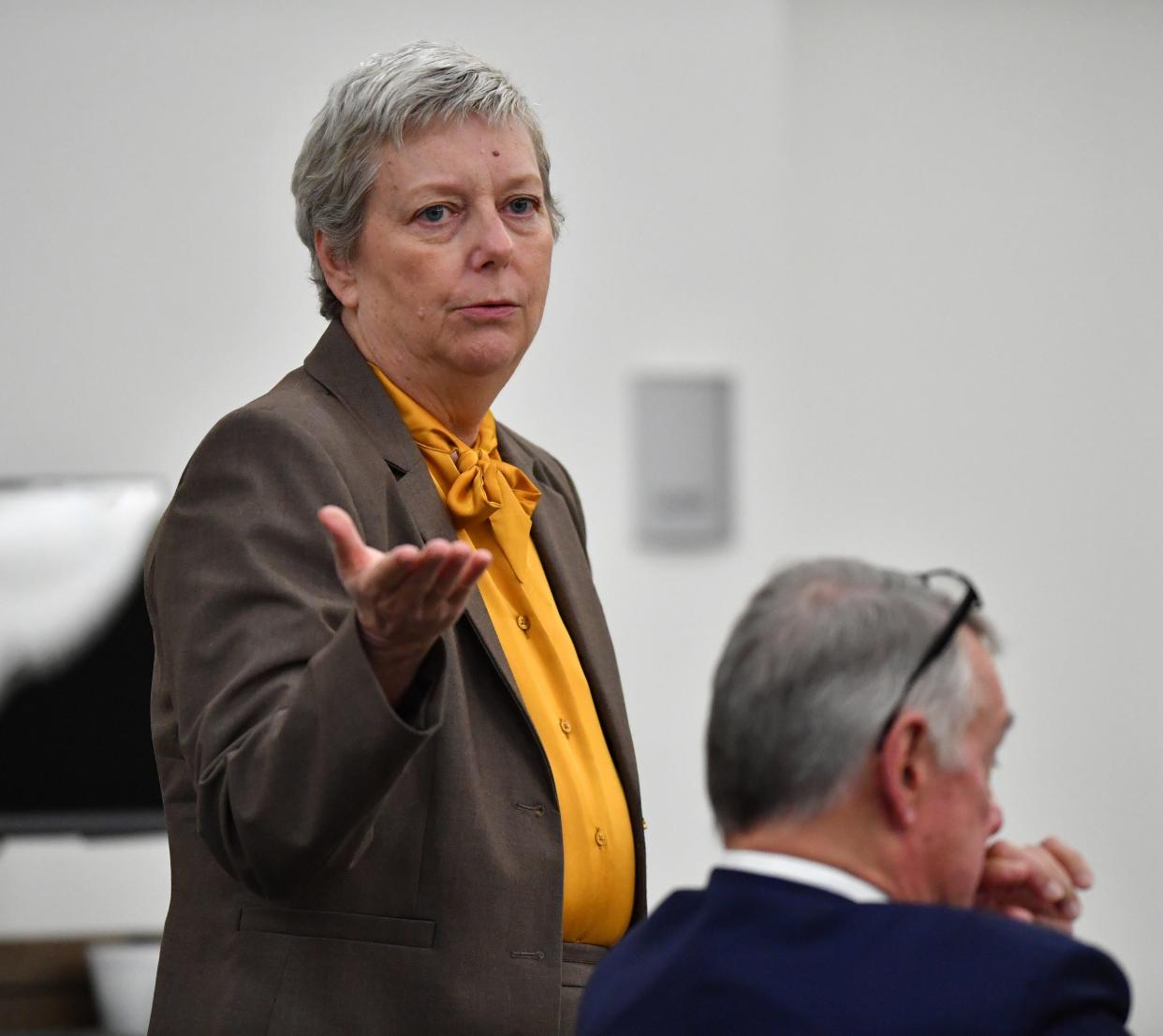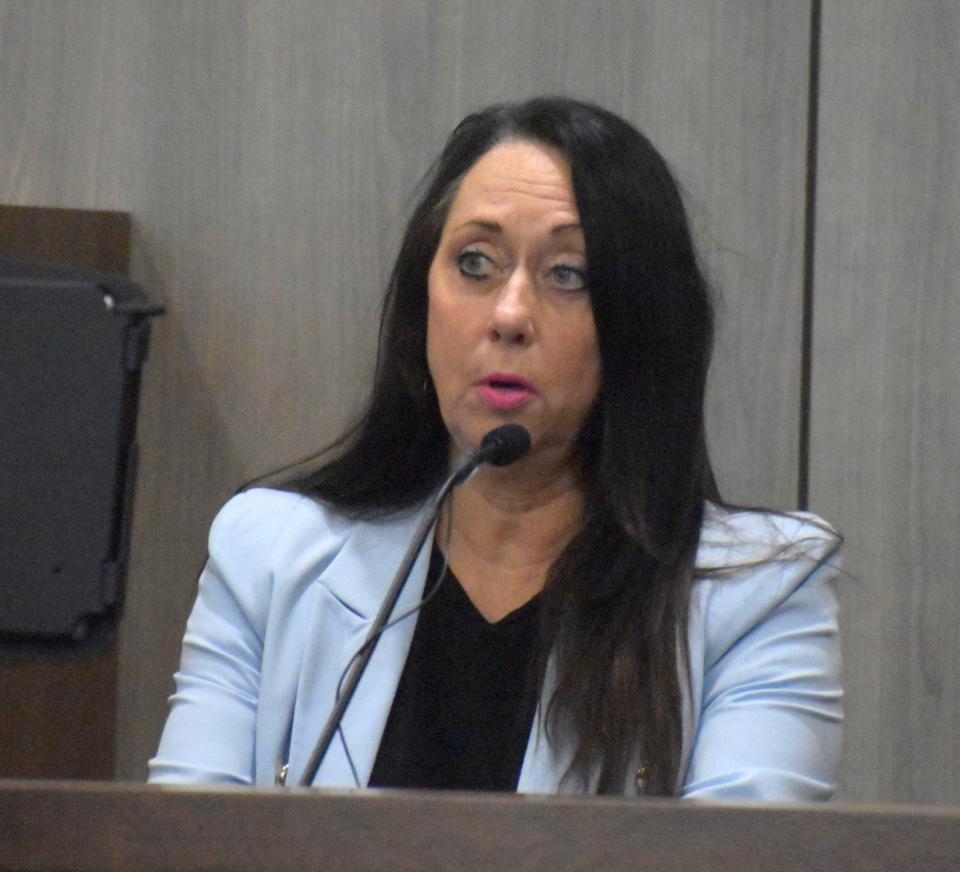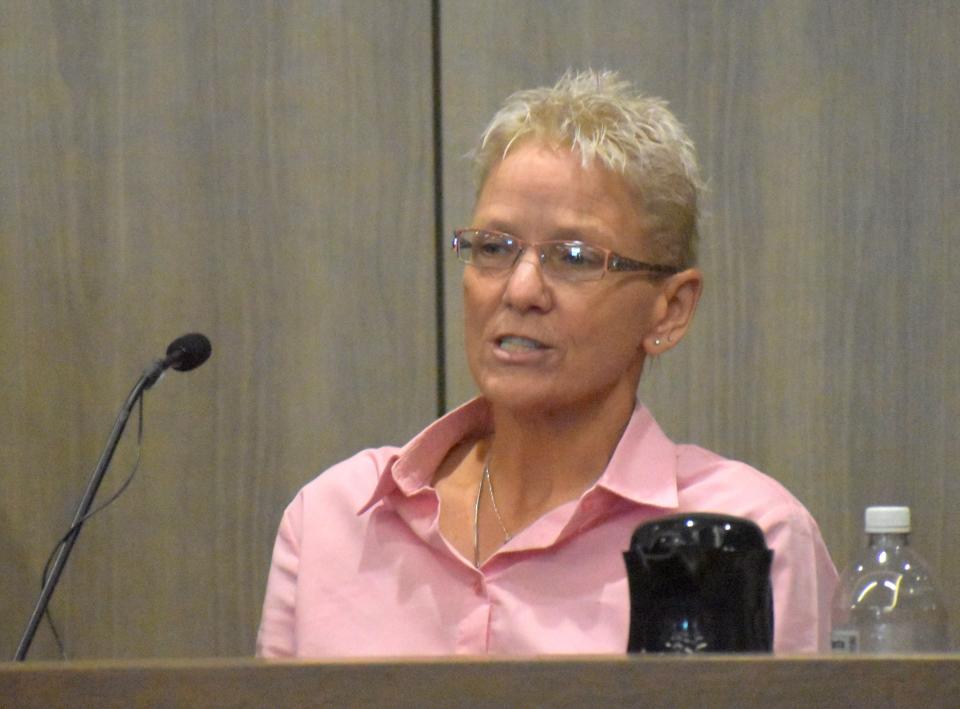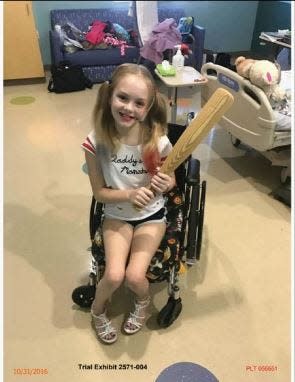Case worker contests identity of voice in audio clips in 'Take Care of Maya' trial

- Oops!Something went wrong.Please try again later.
During the second day of the defense presenting their case in the civil trial of a Venice family suing Johns Hopkins All Children's Hospital, witnesses contradicted testimony about who in fact was heard on a supervised phone call and how Maya Kowalski was doing while at the hospital.
The Kowalski family sued All Children’s Hospital in 2018 for false imprisonment, negligent infliction of emotional distress, medical negligence, battery, and other claims more than a year after the family matriarch, Beata Kowalski, took her life following allegations she was abusing her daughter.
More trial coverage: Kowalskis testify about personal, economic impact for damages
The family took 10-year-old Maya Kowalski to All Children’s Hospital in October 2016 after she complained of severe stomach pain, believed by the family to be a relapse of her Complex Regional Pain Syndrome, a disorder that impairs the central nervous system and heightens pain sensations. The illness is sometimes also referred to as Reflex Sympathetic Dystrophy Syndrome.
Maya Kowalski was separated from her family, friends, and community following a Florida Department of Children and Families investigation and ordered by a judge to remain at the hospital. She remained separated for three months before reuniting with her father and brother shortly after her mother’s death.
Identity of voice on supervised phone calls between Beata and Maya Kowalski contested
Charlotte LaPorte, a case worker involved in Maya Kowalski's DCF case, held firm in confirming that the voice in the three phone audio snippets presented before the jury multiple times now in court was hers.
Earlier in the trial, both Maya Kowalski and Jessica Blackrick, Maya's court-appointed guardian ad litem who had supervised two or three calls, had testified that the voice on the call was that of social worker Catherine Bedy.
Bedy would sit at the edge of Maya's bed during supervised phone calls and make faces or roll her eyes whenever Beata Kowalski was speaking with her daughter, Maya Kowalski said, adding that Bedy was "acting like a child."

LaPorte was assigned to the case in November 2016. In an email, submitted into evidence and published before the jury, LaPorte had reached out to Beata Kowalski on Nov. 15, 2016, prior to an initial phone call to discuss the boundaries for the supervised phone calls. Some of the restrictions included Beata Kowalski not being able to ask about Maya's pain therapies or her mental health, she couldn't communicate in Polish, and she was asked to keep the conversations positive.
After each audio clip presented to the jury, LaPorte confirmed it was her voice.
"There's no question, it's me, it's absolutely me," LaPorte said.
Patricia Crauwels, an attorney for the hospital, questioned LaPorte about the fact that there weren't as many calls as Beata Kowalski would have liked, and that she would have liked to have daily calls. LaPorte admitted that that was true, however, it wasn't feasible.
In order to set up the supervised calls, LaPorte had to coordinate her schedule with a chain of others including Beata Kowalski, Bedy and Maya Kowalski, which meant that the calls couldn't happen every day.
LaPorte was also in charge of reviewing any letters or emails Beata Kowalski sent to her daughter, forwarding them to Bedy so she could deliver them to Maya. LaPorte did mention there were a few times when she had to ask Beata Kowalski to resend her emails as LaPorte hadn't initially received them.
When asked by the Kowalski's family attorney, Greg Anderson, how she knew if Maya Kowalski received them or if there was a log kept of her sending the email to Bedy and Bedy giving them to Maya, LaPorte said that the emails were her log. However, Anderson pointed out that there were no details in LaPorte's notes about whether Maya received the emails.
Keep reading more trial coverage: Maya Kowalski testifies about hospital experience
In case you missed it: Sarasota judge expresses frustrations with attorneys in 'Take Care of Maya' case
Anderson also focused a portion of his questioning regarding one snippet of an audio call in which Maya Kowalski told her mom she could no longer pull up her pants before LaPorte redirected the conversation.
Anderson asked if LaPorte had followed up with anyone had the hospital about what she had heard, with LaPorte saying that she hadn't, but Beata Kowalski could have. She added she wasn't trying to overanalyze phone calls, but rather focus on ensuring it was a quality call.
Anderson also asked LaPorte if she knew that Beata Kowalski didn't want Bedy in the room during the calls. LaPorte said she recalled an email from Beata that said she didn't want Bedy in there and that she didn't want the call on speaker. LaPorte added that Bedy in no way asserted herself on the calls.
Family support intervention specialist: Maya's feet were 'anatomically correct' and she didn't show signs of pain

Tori Niehus was a former family support intervention specialist with Safe Children's Coalition, a nonprofit community provider who partnered with the child protection investigators and supervised four visits between Maya Kowalski and her father in October and November 2016.
According to Niehus' testimony, during all four of her visits, Maya Kowalski appeared to be in high spirits, was moving around freely in her wheelchair, was eating plenty of food, and, in her opinion, Maya was being appropriately taken care of by the hospital. Niehus also stressed that Maya Kowalski's feet were anatomically correct every single time she saw her.
Niehus recalled one incident when she visited Maya Kowalski for a supervised visit on Halloween. Previously, Jack Kowalski had been allowed to bring his daughter items like a Harley Quinn costume and some make-up in preparation.
When Niehus saw Maya, she described her as being very colorful — her hair was pink and blue like the character's, and she was wearing make-up, the costume, and a pair of cork-wedged heels. Niehus said that Maya moved around freely in her wheelchair during the visit, using her feet which were again, described as being anatomically straight.
The only time that she could recall Maya's feet not being straight was when Jack Kowalski was talking to his daughter and Maya mentioned if her feet looked like they were turned inward. When Jack Kowalski agreed, Niehus said she observed Maya turn her feet inward more.
However, when Anderson questioned Niehus about her observations of Maya's feet always being straight, he introduced into evidence a photograph of Maya Kowalski during the Halloween visit, depicting her wearing her Harley Quinn costume and sitting in her wheelchair. Anderson pointed out that Maya's feet were turned slightly inward in the photo.

She also recalled during her fourth visit that Maya's room appeared to be very clean and organized, remembering that Maya was able to get under a chair to organize the shoes in a row underneath it.
In each of her visits, Niehus said Maya Kowalski never showed any signs that she was in pain, she never complained, and regularly sat with her feet crossed. In addition, she was absolutely shocked when Maya Kowalski was upset that she was only getting Tylenol and once asked for morphine.
"I was shocked," Niehus said. "Because this child never once displayed any signs of pain. I have dealt with a lot of people in 23 years in a lot of serious pain and she never once displayed any kind of pain, but she specifically stated that she wanted morphine."
Anderson grilled Niehus, peppering her with questions aimed at her statement that she never saw Maya Kowalski in pain, despite Maya on several occasions stating to her father that she was in pain or feeling pain, including mentioning that felt pain at an old IV line site, that she hurt during her physical therapy, and that she woke up in pain.
Niehus said that even if Maya Kowalski had said she was in pain, she didn't show any other signs throughout the visits that would indicate she was in severe pain, even roughhousing with her brother during the first supervised visit.
More 'Take Care of Maya' trial: Jury hears Maya's former attorney, doctor and social worker
Keep reading: Father takes stand, Sarasota judge denies 2 mistrial motions
Two more video depositions played for jury, including intake ER doctor
Belligerent, demanding, shouting at her husband, and not open to any conversations.
That is how Dr. Laleh Bahar-Posey, an admitting emergency room physician at Johns Hopkins All Children's Hospital, described Beata Kowalski when she first met her after Maya Kowalski was admitted to the ER on Oct. 8, 2016.
Bahar-Posey, who died in June 2022, gave testimony via video deposition on Tuesday, describing her concern over the level of ketamine Beata Kowalski was asking to be given to her daughter.
When asked to give further details about how Beata Kowalski was "behaving erratically," Barah-Posey said that Beata was shouting at her husband, telling him to "not touch her child," kept asking for ketamine over and over, but didn't allow Bahar-Posey to do any testing.
"She was not open to any conversations, or nothing was negotiable but her way. She was not concerned about the child’s medical condition if she had presented there for abdominal pain, you would want some tests to be done to find out why the child had abdominal pain," Bahar-Posey said. "That was not her concern. Her concern was merely administering Ketamine over and over and over and more and more and more.”
![Beata Kowalski with her daughter, Maya. [Provided by the Kowalski family]](https://s.yimg.com/ny/api/res/1.2/KyD.0g2sW28gf37OAu4HHw--/YXBwaWQ9aGlnaGxhbmRlcjt3PTk2MDtoPTEwMDc-/https://media.zenfs.com/en/herald-tribune/5803353e1657aafc2ceef482ee818003)
Bahar-Posey also testified to the fact that she was not the one to report anything to the abuse hotline, adding that she's seen children with all types of parents come into the ER and if she had to report all the people who had mental health problems who've come in, then the state wouldn't be able to handle it.
Bonnie Rice, a nurse practitioner with Tampa General Hospital, recalled that Maya Kowalski's case was a frustrating one for the team, as she felt that while Maya was making some progress, Rice wasn't able to get through to the family and move them down the road of recovery. Maya Kowalski spent a month at Tampa General Hospital between July and August 2015 for intensive physical therapy.
“I tried to connect with her in every way that I could," Rice said. "Our job in rehab is we’ll try a thousand different things to get kids moving again, and I think Dr. McCain and I talked about this mom almost every day because I felt like I couldn’t connect, and I couldn’t sway her perception of reality.”
In Rice's opinion, she testified that Maya and Beata Kowalski were in a battle of wills and that Maya Kowalski was acting on her dependency as a way to gain her parents' attention.
She recalled a moment when Beata Kowalski "set up her office" on a second bed in Maya's room and had her laptop, cell phone and was working from the hospital room, when Maya complained her mom wasn't paying her attention.
Rice also constantly circled back to her example that there had been multiple times when Maya Kowalski would be doing an exercise with a physical therapist and when her mom walked into the room, and on occasion when her dad did, she'd stop and start crying, saying she couldn't do it.
At one point, Beata Kowalski was asked to not stay at the hospital with Maya in her room for a few days, and Rice said the team observed that Maya's progress normalized.
Rice added that Beata Kowalski was hyper-focused on medical tests and treatments, but the hospital's multidisciplinary team felt Maya's problems had psychological and psychiatric overlays.
"I think she was desperate to find a medical cause and treat medical causes because I don't think the mom could wrap her head around the fact that her daughter had, you know, this cute, charming, fantastic little girl, had ... serious psychiatric and psychological problems that probably warranted an inpatient psych stay," Rice said.
When pressed that Rice had accused Beata Kowalski of doctor shopping, Rice said she didn't accuse Beata of anything and that it had been in the medical records.
Gabriela Szymanowska covers the legal system for the Herald-Tribune in partnership with Report for America. You can support her work with a tax-deductible donation to Report for America. Contact Gabriela Szymanowska at gszymanowska@gannett.com, or on Twitter.
This article originally appeared on Sarasota Herald-Tribune: 'Take Care of Maya' trial: Jury presented with contradictory evidence

